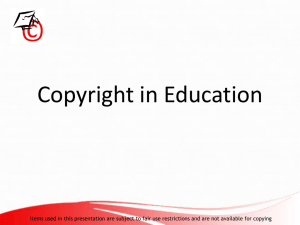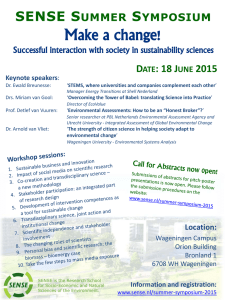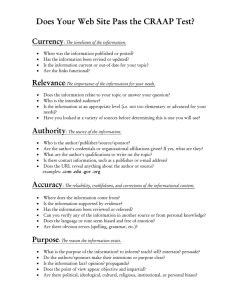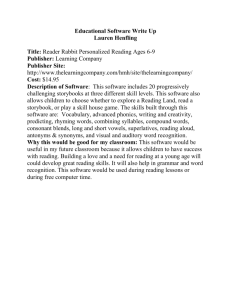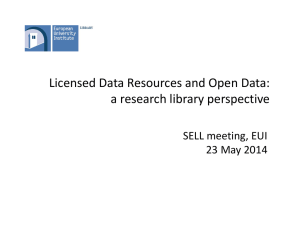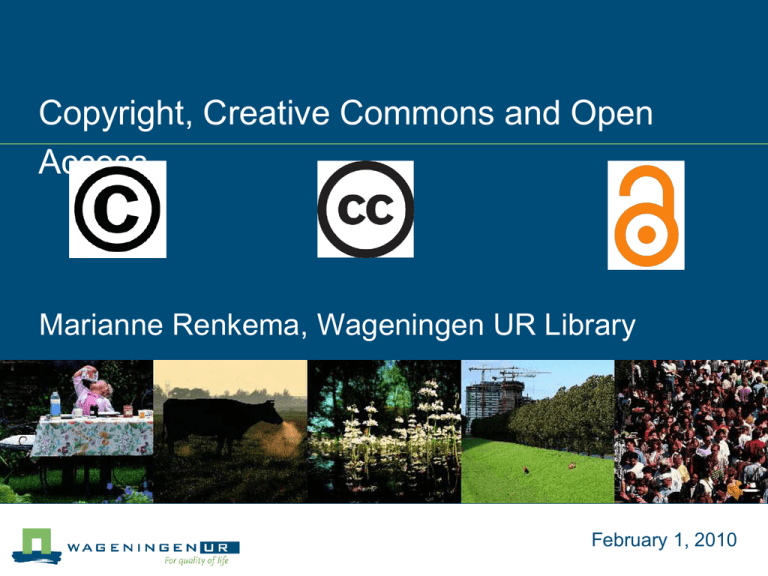
Copyright, Creative Commons and Open
Access
Marianne Renkema, Wageningen UR Library
February 1, 2010
The “Copyright Landscape”
SURF Foundation/JISC
Copyright
Also called author’s right or auteursrechten
Legal protection of literary or artistic work
(Dutch law: a work of science, literature or art)
You are not allowed to copy or adapt the material without
permission
Reasons for copyright law:
Stimulation of creativity and publishing of work
Protection of author regarding commercial and fair use
Criteria for obtaining copyright
Work has to be original
No protection of ideas or information, but of the
expression of it
Facts or theories are not protected
(Work needs to be recorded)
Berne Convention for the Protection of Literary and
Artistic Works (1886)
Three basic principles
national treatment foreign and native authors have the same rights
“automatic” protection no registration required
“independence” of protection what law is effective depends on
where you are, not on country of origin
Berne convention: Exclusive rights of authorization
the right to translate,
the right to make adaptations and arrangements of the
work,
the right to perform in public dramatic, dramatico-musical
and musical works,
the right to recite in public literary works,
the right to communicate to the public the performance of
such works,
the right to broadcast,
the right to make reproductions in any manner or form,
the right to use the work as a basis for an audiovisual
work, and the right to reproduce, distribute, perform in
public or communicate to the public that audiovisual work
Berne convention: Moral or personality rights
the right to claim authorship of the work
the right to object to any mutilation or deformation
of the work which would damage the author’s
honor or reputation.
Berne convention: Minimum duration
Until 50 years after author’s death
Until 50 years after publication (anonymous
works)
Until 50 years after publication/release
(audiovisual works)
Until 25 years after creation (applied art,
photographs)
Other copyright conventions
Universal Copyright Convention (1952)
WTO – TRIPS (Agreement on Trade-Related
Aspects of Intellectual Property Rights)
WIPO Copyright Treaty (1996)
Legislation per country/region
Collection of Laws for Electronic Access (CLEA)
http://www.wipo.int/clea/en/
Access to all legislation on intellectual property per
country or region
Crews KD, Ramos J. (2006) Comparitive analysis of
World Copyright Law: Issues for University
Scholarship.
http://copyright.surf.nl/copyright/files/International_Comparative_Cha
rt_Zwolle_III_rev071306.pdf
Automatic protection
Formal registration of copyright is not necessary,
but can give additional benefits in some countries
(e.g. USA)
A copyright notice is not required, but it…
Makes clear that the work is copyright protected
Shows who the copyright owner is
So, it is strongly advised to give it!
Copyright notice
Consists of
the word copyright or the symbol ©
the year of first publication
the name of the copyright owner
Examples:
Copyright 2010, John Johnson
© John Johnson 2010
In the Netherlands you write:
“dit werk is auteursrechtelijk beschermd”
Copyright owner
Initially:
Author
Supervisor
Employer of the author
A copyright can be partly or completely sold, given
away, waived or inherited
Written and signed document
License for some rights
Question 1
Are you allowed to make a copy of a research
paper for personal use?
Yes
No
Question 2
Is a lecturer allowed to make copies of a research
paper for distribution among his or her students?
Yes
No
Question 3
Is a librarian allowed to make a copy of a research
paper for you?
Yes
No
Question 4
Do libraries have to pay a lending remuneration?
Yes
No
Question 5
Who owns copyright of a MSc thesis?
… and of a PhD thesis?
Question 6
Does public availability of a work on internet mean
that it is in the public domain (i.e. not copyright
protected anymore)?
Question 7
Is plagiarism the same as violating copyright?
Reasons for legal uncertainty
Use of undefined words: original, substantial,
reasonable
New situations
Agreements between stakeholders
Verdicts in law cases
So, it is a matter of risk management when you deal
with copyright
Readers
Stichting PRO
Short pieces:
Compensation paid in advance
Not necessary to ask for permission
Lecturer has to send (part of) reader to Stichting PRO
Long work:
Lecturer has to ask copyright owner for permission directly or via
Stichting PRO
Library
Some licenses with publishers allow for inclusion of
articles in readers, see http://library.wur.nl/copyright/
Creative Commons
http://creativecommons.org/videos/wanna-worktogether
Creative Commons
From “All rights reserved” to “Some rights reserved”
Attribution
Share alike
Non-commercial
No derivative works
Six licenses:
Public domain
= No copyright on the work
Copyright is expired
All law text or jurisdiction (Netherlands) or
government publications (USA)
The author waived the copyright (you keep some
moral rights)
CC0 – ‘No rights reserved’ license
Written statement by the author
Science Commons
Access to publications
Material transfer agreements
Exchange of data
Databases
Patents
Software
Introduction to Science Commons by Wilbanks and Boyle
(2006) http://www.sciencecommons.org/wpcontent/uploads/ScienceCommons_Concept_Paper.pdf
Open Access to Knowledge
Berlin Declaration (2003)
http://oa.mpg.de/openaccess-berlin/berlin_declaration.pdf
Open Access Publishing
Online free articles (and datasets)
Golden road open access with open access journals
Green road open access through repositories and/or self-archiving
http://www.openaccess.nl
Open Access Journals (Golden Road)
Traditional business model
Researcher writes paper and transfers copyright to publisher
Publisher publishes the paper in a subscription based journal
Researcher is restricted in re-using the paper for other purposes
Access to the paper is limited
Open Access model
Author pays publisher to publish a paper
Author keeps copyright
Access to paper free
Author-paysmodel
Wageningen UR library has an Open Access fund
NWO just started a fund
UKB-Springer Open Choice deal
No fee for OA
Directory of Open Access Journals
http://www.doaj.org/
Repositories (Green road)
Institutional repositories
NARCIS http://www.narcis.info/index
HBO Kennisbank http://www.hbo-kennisbank.nl
Subject repositories
Example: ArXiv.org
Directory of Open Access Repositories
http://www.opendoar.org
Wageningen University repository
Wageningen Yield http://library.wur.nl/way
Online PhD theses, since September 2002
Some with embargo of 6 months
Reports
Abstracts, conference papers
Journal articles
Pre-prints (version before peer review)
Post-prints (version after peer review)
Final version (published version)
What is allowed?
Open Access articles can be archived without
restriction (from an author’s point of view)
For all other journal articles it depends on what
you agreed with the Publisher
Copyright Transfer Agreement
SHERPA/RoMEO website
http://www.sherpa.ac.uk/romeo/
Alternatives for the Copyright Transfer Agreement
Author rights, your rights
http://www.youtube.com/watch?v=hWZ_ZYbAIyg
&feature=player_embedded#
SURF Foundation: License to Publish
Publisher can publish the paper and make money with it
Author keeps copyright
Delayed access in repositories
SURF Foundation/JISC: Copyright Toolbox
http://copyrighttoolbox.surf.nl/copyrighttoolbox/
The “Copyright Landscape”
Copyright in higher education:
http://www.surffoundation.nl/Auteursrechten/en/Pages/Default.aspx
http://dx.doi.org/10.1093/database/bap024

